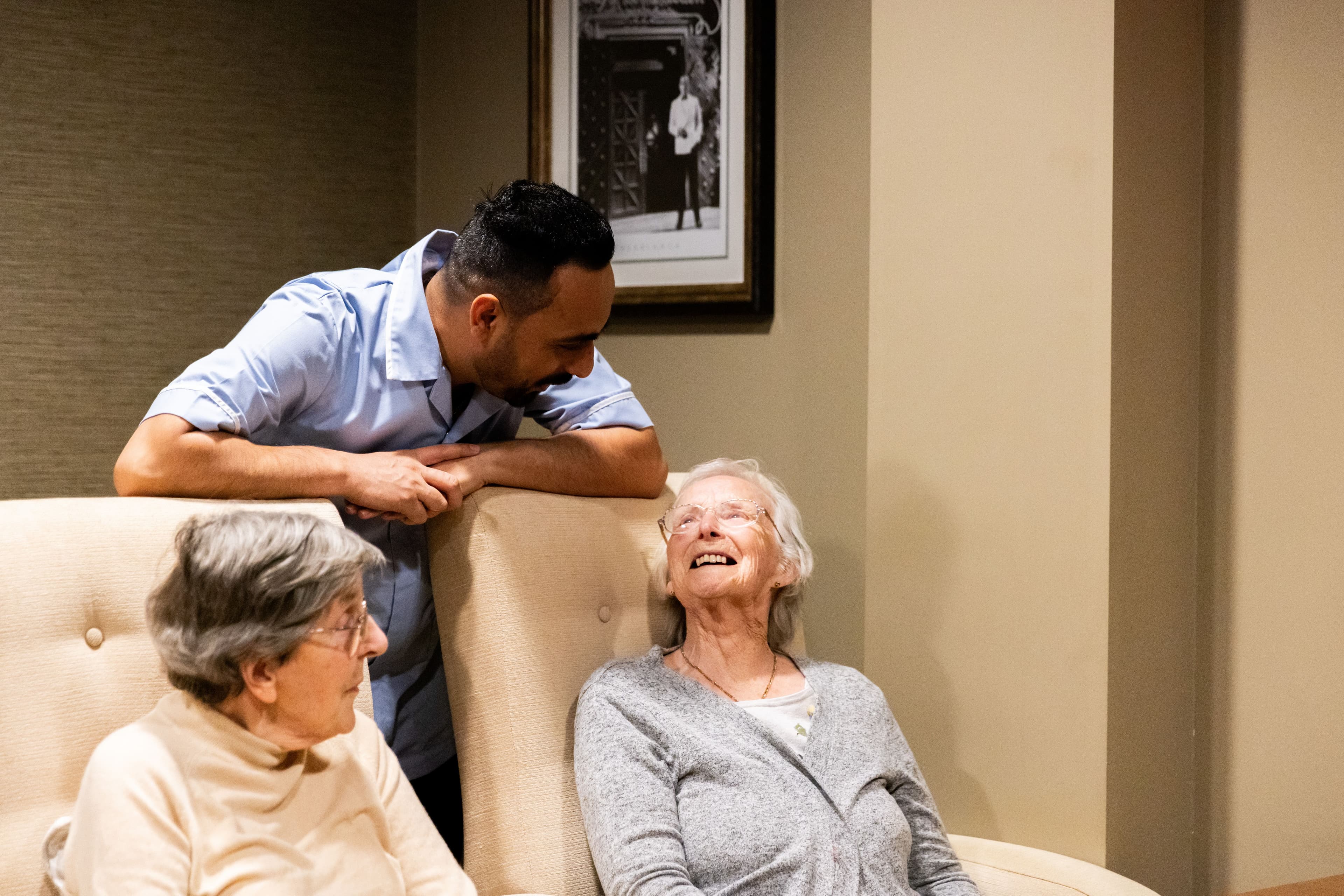Your free guide to finding respite care.
Get your own personal list of respite care options in moments. For free.
Used by over
18,000 families every month

How does Lottie help families find the right care?
Find the right respite care home in just three simple steps...

1
Personalise your search
Let us know your care needs, budget and location, as well as your estimated move in date.

2
Compare homes
Lottie will send you a free shortlist of care homes tailored to your individual needs.

3
Enquire directly
Once you've found your perfect match, enquire directly, or request further support from Lottie's team of care experts.
Start your respite care search today!
Enter your location to compare recommended respite care near you.
What is respite care in a care home?

Respite stays
Respite care provides short-term support in a care home, often after a hospital stay or to give regular carers a break. It’s a flexible option that offers professional care in a safe setting — without the need for a permanent move.

Long term stays
Long-term care offers a permanent home for people with ongoing care needs. It’s ideal for those who need continuous support and are looking to settle in a safe and supportive environment.
Why families trust Lottie to find respite care
Proudly rated the UK’s number one service in Trustpilot’s “Aged Care” category, Lottie helps over 40,000 families match with care every month.

Free expert support
Our Care Experts offer free support to help you find short-term or emergency respite care, understand funding options, and feel supported.

Pricing transparency
Benefit from full transparency with Lottie by being able to request detailed pricing information for every care home and specific care types.

Free personalised shortlist
Need a little extra help? Get your care search off to a great start by requesting a free shortlist of recommended homes from Lottie’s team of care experts.
Types of care explained
We know that choosing the right care home is an important decision. We're here to help you find trusted, high-quality care tailored to your needs.

Residential care
Support with everyday tasks like washing, dressing and mealtimes, provided by trained carers. A good option for those who need day-to-day help but don’t require nursing or specialist dementia care.

Dementia care
Specialist care for people living with mid to late stage dementia. Staff are trained to provide safe, structured, and compassionate care tailored to each person’s needs.

Nursing care
24/7 support from qualified nurses for people with complex or ongoing medical needs, such as wound care, injections, or long-term conditions, alongside help with personal care like dressing and washing.
Advice from Lottie’s team of care experts
Explore practical guidance on respite care – reviewed by Lottie’s care expert team to help you make confident short-term care decisions.
Testimonials from Lottie's care seekers
Choosing the right respite care home is a big decision, and we’re here to support you - just like we have for many others. See what they have to say…
Klara @ Lottie was knowledgeable about respite care and took stress away at a hard time. Highly recommend this service.
Gemma
21st April 2025
Eva’s voice and caring manner put me at ease while exploring 10-day respite for my 97yr old mum. She’ll send info tailored to Mum’s needs.
Gillian
16th April 2025
Very helpful with respite care. Mum moves in tomorrow! Katie called to check in. Lovely Mum gets a welcome gift. Highly recommend.
Sue
6th April 2025
The service takes all the hassle and stress away. I highly recommend.
Emma
22nd February 2025
Lottie was so helpful finding the right kind of homes in the right area. Comprehensive information - invaluable really.
Sara
1st February 2025
Lottie is the 1st organisation I have come across who have been willing to understand and help.
Jacqueline
23rd January 2025
Absolutely amazing service. Couldn't have asked for more support. Thanks so much Eva you've made such a difference to what could have been a really stressful process.
Stuart
12th November 2024
Frequently asked questions about respite care
How much does a respite care home cost?
Here's a breakdown of average respite care costs in the UK by type:
- Residential respite care: £1,488 per week; £6,448 per month
- Nursing respite care: £1,638 per week; £7,098 per month
- Residential dementia respite care: £1,552 per week; £6,725 per month
- Nursing dementia respite care: £1,678 per week; £7,271 per month
Read our full guide to respite care home costs in the UK.
How long can someone stay in respite care?
On average, a respite stay lasts around 2 to 3 weeks, but the length of a respite care stay can vary from anywhere between a few days and a few weeks. It all depends on the person's needs, the reason for the stay, and the minimum respite stay offered by a care home.
Some people book a short stay to cover a family carer's holiday or a short-term break, while others may need a bit longer — for example, during recovery from illness or while waiting for home adaptations to be completed. If respite care is arranged privately, there's often flexibility to stay as long as needed, though longer stays may be reviewed to see if more permanent care is required.
Who is respite care suitable for?
Respite care is for anyone who is a carer for a friend or family member and needs a short break from their caregiving role. It gives carers time to rest or take a holiday while ensuring the person they look after continues to get the support they need.
Are there alternatives to a respite care home?
Yes — respite care doesn’t always mean a stay in a care home. There are several other options that can give carers a much-needed break while still ensuring the person they care for is well supported.
Some common alternatives include:
- Home care – A paid carer visits the person’s home to help with daily tasks, offer companionship, or take them out shopping and even to socialise.
- Day care centres – These provide social activities, meals, and sometimes outings, giving carers a few hours or a full day of respite. Many care homes listed through Lottie offer day care services.
- Sitting services – Volunteers or paid carers spend time with the person you care for so you can have a break.
- Help from friends or family – A trusted friend or relative may be able to step in now and again.
- Respite holidays – Some services offer supported holidays for carers and the people they care for, or breaks where the person can go away while being looked after.
The right option will depend on your needs, preferences, and what's available locally. Our Care Experts can help you explore what's on offer by creating a free list of respite care homes in your area.
Do you have to pay for respite care?
Yes, you may need to pay for respite care. Lottie can help you find respite care homes throughout the UK. If you think you require funding support to pay for care, you'll need a financial assessment from your local council. This directly follows a care needs assessment which you can apply for here.
These assessments are free and help the council understand what kind of support you might need. If you qualify, they may cover some or all of the costs, or give you a personal budget to arrange care yourself. If you're not eligible, you can still organise respite care privately, but you'll need to pay for it.
It's also a good idea to check with local carers' groups or charities, as they may offer extra help or funding for short breaks. Learn more about the cost of respite care here.
How do I arrange respite care in a care home?
We're here to help you find the right respite care option for you or your loved one. Request a free list of respite care homes, and our Care Experts will send you curated options that match your unique requirements, such as budget and location.
If you're seeking funding support, you'll need a financial assessment to determine whether you or your local authority will pay for care.
Some care homes accept advance bookings for respite stays, which is useful if you're planning ahead — for example, around a holiday. Availability can be limited at short notice, so it's best to plan in advance where possible. If you're arranging privately, simply contact the care home to discuss availability, costs, and how long a stay can last.
What type of care is provided during a respite stay?
During a respite stay, your loved one will receive the same level of care and attention as permanent residents — just on a short-term basis. This can include help with personal care (like washing and dressing), medication support, nutritious meals, and a full programme of social activities.
Many care homes also create a temporary care plan tailored to the person's specific needs and routines, so they feel as comfortable and supported as possible while away from home. Respite stays can be as short as a few days or several weeks, depending on what's needed and a home's minimum respite stay.
Can people with nursing needs or dementia use respite care?
Yes, respite care is available for people with a wide range of needs, including dementia and other complex medical conditions. Many care homes offer specialist dementia care or have nursing staff on-site who can provide support with things like wound care, catheter management, or recovery after surgery.
If your loved one has a specific diagnosis or medical requirement, it's important to choose a care home that is experienced in providing that type of support. With Lottie, you can request a shortlist of respite options that match your loved one's exact care needs.
Can I book respite care in advance?
Yes — in fact, we recommend it. While some respite stays are arranged urgently (for example, after a hospital stay or when a family carer is unwell), many families book respite care in advance to give everyone peace of mind.
You might book a short stay around a holiday or simply plan ahead so a regular carer can take a break. Booking early also gives you time to visit the care home, speak with the team, and help your loved one feel more familiar within their new surroundings before the stay.
Is a care needs assessment required for respite care?
Not always. You can arrange respite care privately at any time without a formal care needs assessment. Simply request a shortlist through Lottie or download a brochure from one of our listing pages — and you can start arranging a stay whenever you're ready.
However, if you're applying for respite care funding through your local council, a care needs assessment will be needed. This helps determine what kind of support is needed and whether the council can cover the cost.
What are the benefits of respite care for carers?
It's incredibly rewarding to care for a loved one, but it can also be physically and emotionally exhausting. Respite care gives carers the chance to rest and look after their own health and wellbeing, knowing their loved one is being safely looked after.
It's not selfish to take a break — it's essential. Regular respite can prevent burnout and help family carers continue providing support for longer. It also gives loved ones a change of scenery, the chance to meet new people and take part in activities they might not experience at home.
Can respite care help someone transition into full-time care?
Yes — respite care can be a gentle and supportive way to explore whether full-time care is the right step. A short stay gives your loved one the opportunity to experience life in a care home, meet the staff and other residents, and see how it feels — without making a long-term commitment straight away.
Many families use respite as a 'trial run' to ease the emotional transition and give everyone the time to adjust. If the stay goes well, it's often possible to extend it or begin planning for a more permanent move.
Can I visit the care home before booking respite care?
Absolutely — and we strongly encourage it. Visiting in person gives you the chance to meet the team, see the setting, and ask any questions you may have. You'll get a better feel for the home's atmosphere, how staff interact with residents, the types of activities on offer, and whether it feels like a good fit for your loved one. You can also view rooms and bedrooms, sample resident menus and speak about any specific care needs or preferences.
Looking for a specific provider?
Respite care trends and insights from Lottie
Respite care insights based on real search, enquiry, and booking data from Lottie users.
Many people need respite care to start immediately
Two in five people searching for respite care need it to start immediately - whether it’s to provide emergency care, provide a break for a family caregiver or support recovery after a hospital stay.
If you suddenly need care, we will help you find the right support quickly. Our Care Experts can send you a free respite care home shortlist for urgent support.
Demand for respite care increases during the holidays
Many families plan short-term care around holidays, either to take a break or when regular support isn’t available. That’s why searches for respite care peak during the summer months - particularly August - and festive seasons.
If you’re planning care for the holidays, it’s best to book early.
Many families trial longer-term care with respite stays
Many families choose a short respite stay to explore whether longer-term care might be the right fit. It gives your loved one time to settle in, meet the team, and experience daily life at the home.
If it feels like a good match, extending the stay or making a more permanent move can usually be arranged with ease. And of course, care home staff are always on hand to make the transition as smooth and supportive as possible.
Expert advice: how to choose respite care
As a qualified care adviser - and someone who's supported many family carers through this decision - I know how important it is to find the right respite care with confidence. Caring for someone you love is incredibly meaningful - but it can also be exhausting. Let me reassure you: it's absolutely okay to take a break, and these three steps can help guide you:
Plan ahead for respite care that fits your needs. Use Lottie to find homes that offer short stays and check availability for your dates. Look at what's included such as meals, care services, activities, and whether there are minimum or maximum stay requirements.
Explore the home's facilities, care approach, and community. Review inspection ratings, staff expertise, and care types offered. If you can, arrange a visit to see if the home feels welcoming, well-equipped, and inclusive of short-term residents in daily routines and activities.
Ask key questions about support, communication, and flexibility. Find out how short-term residents are welcomed, whether care plans are created, how families are kept updated, and whether emergency support or extensions to the stay are possible.
-Hannah Karim, Customer Care Lead at Lottie.















